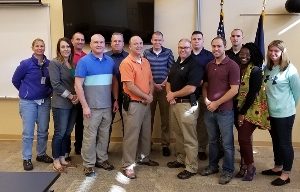
Back Row from Left: Lt. Donna Elam, Captain Brian Baxter (Texas DPS), Lt. Kevin Gray (Texas Highway Patrol), Trp. Ben Rector, Trp. Hunter Manning, Trp. Justin Mears, not pictured but attended: Det. Brandon Davenport and Morgan Rumple (ITVAP)
Indianapolis, In.— Last week seventy-four officials from the law enforcement community from around the state attended a seminar on the Interdiction for the Protection of Children (IPC). The seminar was hosted by the Indiana State Police and U.S. Attorney’s Office for the Northern and Southern Districts of Indiana. Twenty-two troopers from several districts were among the attendees. Others included probation officers, school resource officers, court officers, prosecutors, and several law enforcement agencies.
The class was presented by the Texas Department of Public Safety on Monday and Tuesday and continued on Thursday and Friday with additional certifications for individuals that would become trainers. Four troopers, four ISP detectives and four victim services partners from the Indiana Traffic Victim Assistance Program (ITVAP) obtained their trainer certifications.
The ITVAP works to identify and provide comprehensive services to youth victims of trafficking or sexual exploitation. ITVAP has partnered with existing IPATH task forces, the Indiana State Police, youth services bureaus and Safe Place programs across the state.
The IPC was designed to help make patrol officers more aware of the resources available to them and help assist them establish the status of a child. The IPC teaches a multidisciplinary approach used in combating sex crimes against children and locating and identify missing, endangered and exploited children. It provides an understanding of what courses of action are immediately available to officers. The class also teaches the indicators of an endangered child and the type of questions that need to be asked for a victim centered approach. It provides a basic understanding of behavioral patterns of both suspects and victims and helps the investigator articulate their findings.
This course was offered free of charge thanks to a generous grant from the Office of Community Oriented Policing Services and the U.S. Department of Justice.



